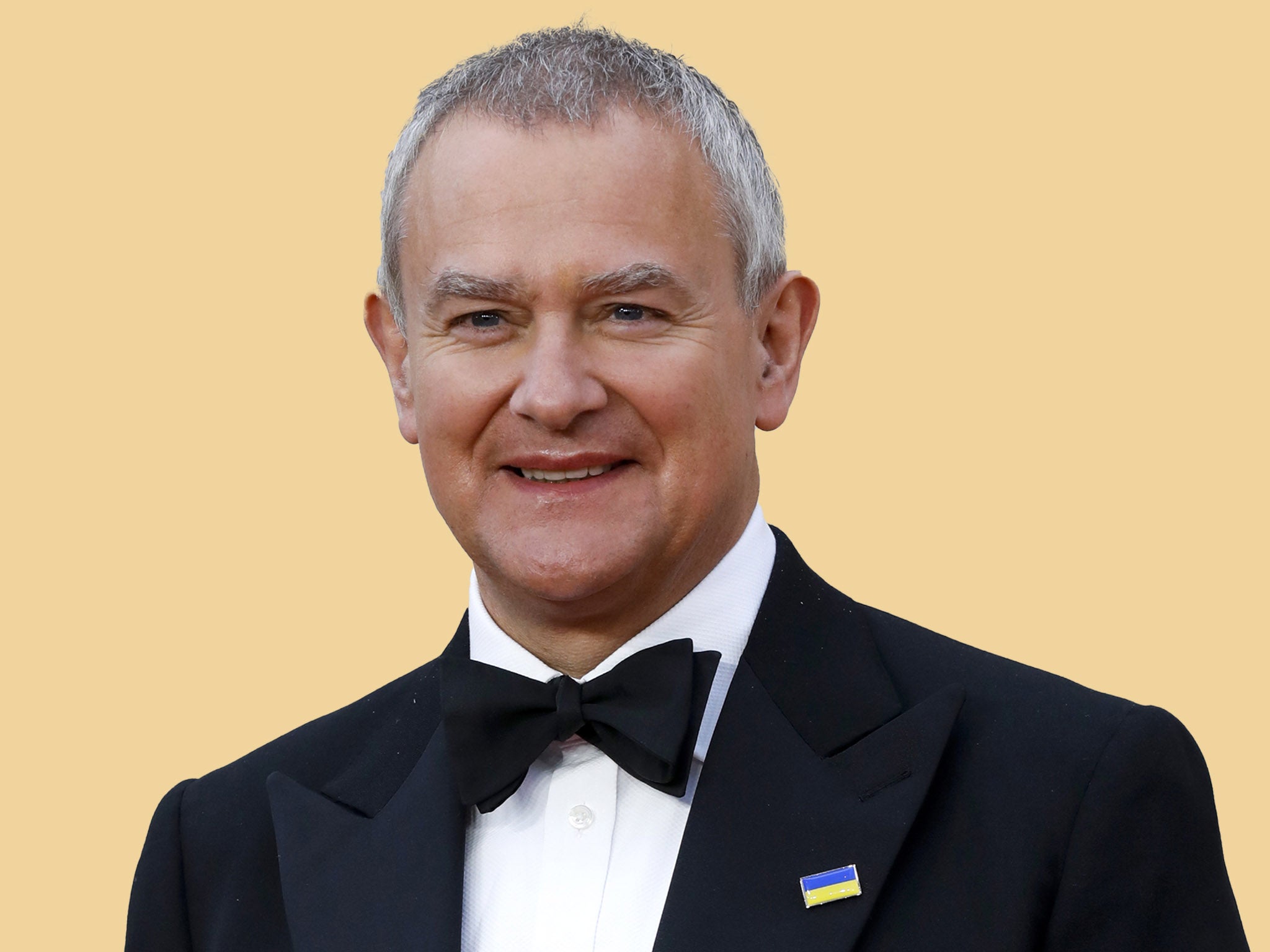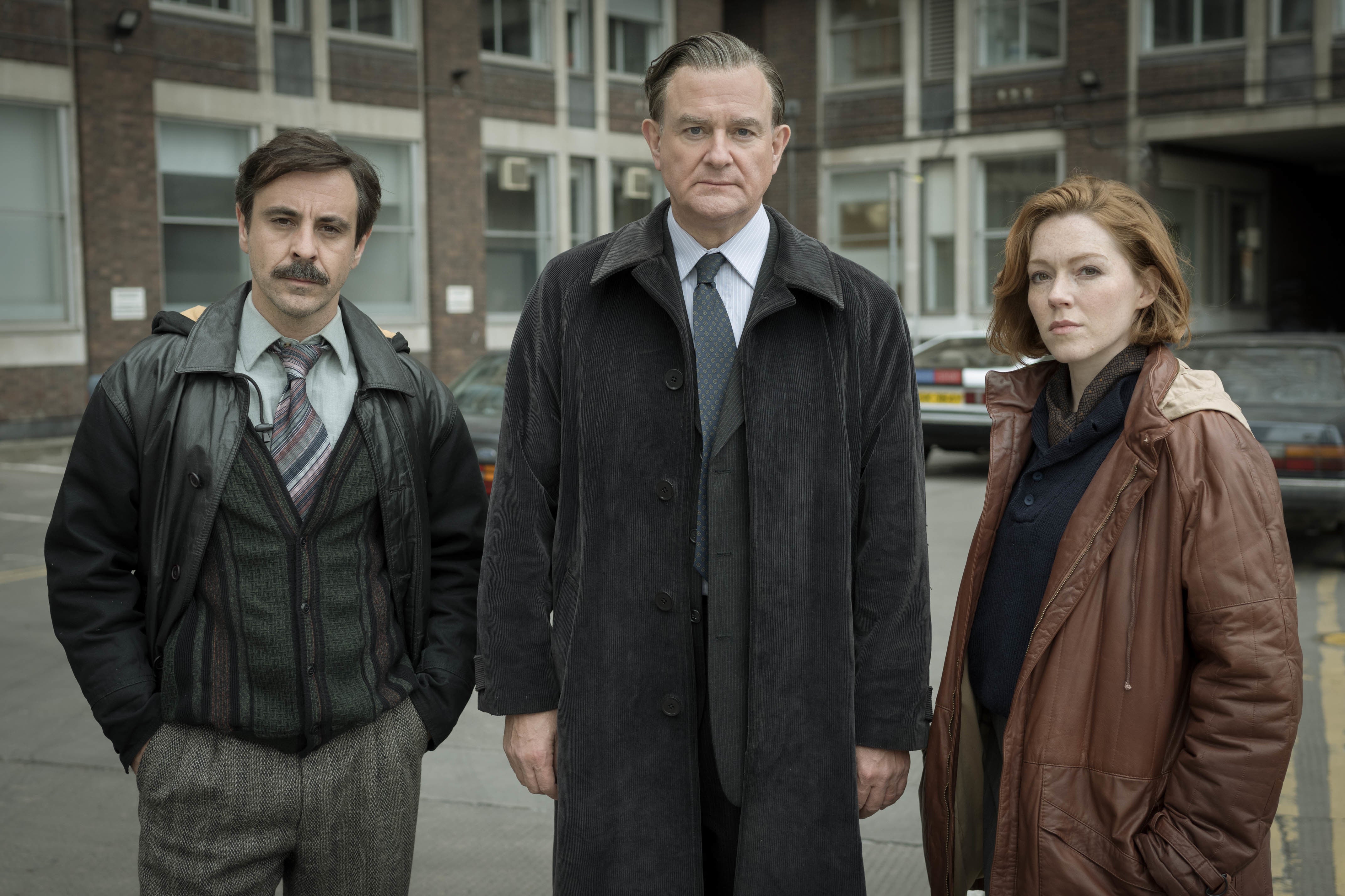‘Those films shouldn’t be cancelled’: Hugh Bonneville on Notting Hill, his new heist drama, and Boris Johnson
The ‘Downton Abbey’ star talks to James Rampton about the NHS, nuclear doom and gloom and his newly published memoir


Your support helps us to tell the story
From reproductive rights to climate change to Big Tech, The Independent is on the ground when the story is developing. Whether it's investigating the financials of Elon Musk's pro-Trump PAC or producing our latest documentary, 'The A Word', which shines a light on the American women fighting for reproductive rights, we know how important it is to parse out the facts from the messaging.
At such a critical moment in US history, we need reporters on the ground. Your donation allows us to keep sending journalists to speak to both sides of the story.
The Independent is trusted by Americans across the entire political spectrum. And unlike many other quality news outlets, we choose not to lock Americans out of our reporting and analysis with paywalls. We believe quality journalism should be available to everyone, paid for by those who can afford it.
Your support makes all the difference.Where do you start with cancelling things? Where do you stop?” says Hugh Bonneville. “Do you never ever produce Titus Andronicus because it involves the murder of infants and the baking of people’s heads in pies? Or The Merchant of Venice or The Taming of the Shrew? Or Hamlet because lots of people die in the end?”
I’m meeting the Downton Abbey star in a low-key coffee shop just off Trafalgar Square. We’re here to talk about The Gold, his new BBC One drama about one of Britain’s biggest ever real-life heists, but right now he’s wrestling with one of the debates of our time – cancel culture – and there’s a good reason for it: Notting Hill. The actor got his first major break in movies in Richard Curtis’s enduringly popular 1999 comedy. He played the stockbroker who asks Julia Roberts, “What do you do?” at a dinner party, before going off on one about actors earning £8,000 a year. Of course, some romcoms are now being reassessed – and not always favourably. Notting Hill has come under fire for failing to convey fully the diversity of the area of London it depicts.
Bonneville, however, thinks we should leave well alone. “Those films certainly shouldn’t be cancelled,” he says. “There was a whole sequence about the multiculturalism of Notting Hill. But test audiences said, ‘Where’s the star? Where’s Julia Roberts?’ So the producers cut out that three-minute multicultural sequence.”
He adds: “I think we all need to take a huge dose of perspective and allow art to be art. All forms of artistic expression should be allowed to breathe. I think respect should always be there – with expression comes responsibility. But I don’t think it’s right to say, ‘I don’t agree with you, therefore you should be cancelled’.”
The 59-year-old has no qualms about engaging with the issues of the day. “I’m an eternal optimist,” he says. All the same, he admits, right now it is increasingly difficult to find reasons to be cheerful.
“I refuse to be depressed,” the actor tells me. “But I do find it harder to be positive than I’ve done for probably 30 years.”
For a start, Bonneville is anxious about the geo-political situation. “I’m probably more aware of doom and gloom than I have been since the nuclear threat when we were growing up. I used to lie awake at night worrying about that in the Seventies and Eighties.
“Look at the – there is no other word for it – evil that has been perpetrated in Ukraine and Iran, and the inability of our politicians to act as a force against them.”
But Bonneville is just as alarmed about what is going on in this country. “Our lack of leadership is quite stunning. The vacuity of the last two or three secretaries of state for culture is embarrassing. The same goes for our recent foreign secretaries, among whom I count Boris Johnson, a man of no principle whatsoever.”

Watch Apple TV+ free for 7 days
New subscribers only. £8.99/mo. after free trial. Plan auto-renews until cancelled

Watch Apple TV+ free for 7 days
New subscribers only. £8.99/mo. after free trial. Plan auto-renews until cancelled
It is on the subject of the NHS, however, that Bonneville becomes really incensed. It is a subject close to his heart. His father was a doctor, his mother a nurse. Also, during the pandemic, the actor volunteered at a vaccination centre near his home in West Sussex.
Boris Johnson [is] a man of no principle whatsoever
“I’m hugely worried about the future of the NHS,” the actor says. “It was the institution for which my parents worked. In the 1970s, dealing with patients directly was the centre of their world, and not filling in forms.
“Now the NHS is a vast institution that is not fit for purpose. It is no coincidence that the only government we’ve had for the last 13 years has been Tory. And now the nurses are going on strike, for goodness’ sake. No nurse that I know wants to strike, but they are literally subsidising the job that they do. It’s heartbreaking. It really is a gloomy time.”
Bonneville is equally exercised by the fact that the government appears to have the BBC in its sights. “It's scandalous that the BBC is under threat. What would we end up with? Just Fox News’s all over the place and opinion-shouting on GB News.”
Don’t let Bonneville’s bleak prognosis about the world deceive you, though. In person, the actor, who is wearing cufflinks in the colours of the Ukrainian flag, is a warm, humorous presence. His lightness of touch is reflected in Playing Under the Piano, his entertaining, recently published memoir.
It contains many delightful showbiz anecdotes, such as the moment he almost ruined a dress rehearsal for his National Theatre debut as a shoemaker in School for Wives by accidentally taking out a large chunk of the volcano scenery with a swing of his 18th-century cobbler’s last. The book also features many poignant passages, as Bonneville recollects his father’s dementia and his brother’s death.
The afternoon of our interview, Bonneville is going on to a promotional event for the book. He is dressed in the deep blue worsted suit that he sports on the cover. He says he wears it to all book events in the hope that it will provide some subliminal advertising.

Very soon, too, he’ll be back on our screens in The Gold, Neil Forsyth’s compelling, six-part account of the aftermath of the notorious 1983 Brink’s-Mat robbery, which starts on BBC One on Sunday. (Forsyth is the writer of the word-of-mouth BBC Two hit Guilt, which will return for a third series this year.)
When a crew of hardened criminals smashed their way into the Brink’s-Mat warehouse at the Heathrow International Trading Estate on 26 November 1983, it was initially viewed as a typical Old Kent Road armed robbery. But it soon turned into something much more significant.
The thieves had plotted to steal £3.2m in cash but after breaking into the warehouse with the help of an inside man, they discovered £26m worth of gold bullion and diamonds. In an instant, the heist was transformed into the largest robbery in world history at the time.
The theft changed British crime and policing forever. It also facilitated large-scale money laundering for the first time. Dirty money from the robbery propelled the London Docklands property boom. Underlining that there is no honour among thieves, the crime also sparked murder and mayhem within the gang.
In The Gold, Bonneville plays DCI Brian Boyce, the real-life senior officer who headed up the task force charged with apprehending the Brink’s-Mat gang.
Schooled on the mean streets of Rotherhithe, the Boyce we see in The Gold is a hard-as-nails copper who is more than the equal of the vicious criminals. Fed up with police officers who are always on the take, Boyce is also utterly incorruptible. For Bonneville, it is a role light years away from the lovable, uxorious Mr Brown of the Paddington movies or the stiff formality of the Earl of Grantham in Downton Abbey.
The robbers are trying to get up the ladder. They’re asking, ‘Why should all these other people in the City have all the money?’
The actor was delighted to have the chance to meet his alter ego in The Gold. “Brian’s 85 and retired. I had a fascinating lunch with him. Because he was a proper straight policeman, he couldn’t bear ‘The Square’, as the Masons are called. He was very much on the record that he didn’t want anything to do with them.”
Boyce’s incorruptibility was underscored in the 1990s, Bonneville notes. “When the Stephen Lawrence case blew up and clearly there was an implication that the suspects were being treated lightly or indeed just getting away with stuff, Boyce volunteered to investigate the police. He said, ‘I’m not having that’. He oversaw an investigation into whether the police had been too lenient.”
The Gold also has very topical things to say about the British class system. The criminals saw their ill-gotten gains as a way of upsetting the established order. “The thread underneath it all is social mobility,” says Bonneville. “The Establishment want to keep things as they are. How do you move the tectonic plates of society?”
In the drama, “There’s this anger bubbling under these criminals from Rotherhithe. The robbers are trying to get up the ladder. They’re asking, ‘Why should all these other people in the City have all the money? We want some of it’.”
Bonneville crossed to the dark side for his most recent screen role, when he played the heinous serial killer and retired High Court judge Sir Hector Blake in the Netflix movie I Came By. The actor found the chilling nature of the fictional Sir Hector to be “his apparent normality. He doesn’t appear at all twisted.
“It’s like the serial killer Ted Bundy, an apparently intelligent, apparently skilled man who defended himself in court. I’ve seen footage of him going to court being really quite chipper and chirpy, and yet we know there’s this truly appalling side to him. And so, in a funny way, the pleasure of playing Sir Hector was the sheer ordinariness of it.”

Social critique features in I Came By as well, as Sir Hector is given a free pass thanks to his seeming respectability. In the end, Bonneville says: “The Establishment wins. Hiding in plain sight is this monster. He’s got his own personal hang-ups and psychotic reasons for doing what he’s doing. But he’s able to get away with it because of his position in society.”
When he was a small boy, Bonneville, who is married to Lulu Williams and has a son called Felix, thought he was too shy to be a performer. Terrified of performing in front of his nursery school class, the four-year-old would play under the piano at his family home in southwest London.
In the book, he recalls: “The instinct to keep it in the shadows, this acting lark, just playing under the piano for fear of looking a fool.” But after starring in school plays such as Alan Ayckbourn’s Ernie’s Incredible Illucinations, he soon overcame his timidity. Bonneville was well and truly bitten by the acting bug.
After many amateur productions at the National Youth Theatre, at Cambridge University, where he read theology, and the Webber Douglas Academy of Dramatic Art, he made his professional stage debut in 1985. He understudied Ralph Fiennes in the role of Lysander in a production of A Midsummer Night’s Dream at the Regent’s Park Open Air Theatre.
Over the next 37 years, Bonneville has played everything from a headmaster in EastEnders and an Air Warfare Officer on HMS Bedford in Tomorrow Never Dies, to Ian Fletcher, the BBC’s head of values, in W1A and Lord Mountbatten in Viceroy’s House.
I think ‘Downton Abbey’ has probably had its day but then again, you never know
After Notting Hill, Bonneville took an ill-fated trip to Los Angeles. In 2005, he signed a seven-year contract to star opposite Jenna Elfman in a US sitcom titled Courting Alex. However, it crashed and burned and was pulled off air halfway through its first and only series.
The actor does not have particularly fond memories of his time in Hollywood. “Gosh,” he recalls, “it still makes me squirm when I look back. I literally found out a year later that the sitcom had been canned, but no one actually told the cast. I’ve still not officially been told that the contract has been terminated because everyone is so terrified in LA!”
The superficiality of many in La-La Land is summed up in Bonneville’s recollection of a meeting he had with an American agent. “I went in to see him and he told me, ‘Hugh, your work is incredible. I’ve loved everything you’ve done!’ It was virtually hugs and kisses.
“Then I left but as I walked down the corridor, I thought, oh God, I’ve left my jacket behind. So I went back into his office and said, ‘I’m so sorry, I forgot my jacket’. The agent literally had no idea who I was. He just said, ‘Oh, yeah, sure. Take your jacket. Yeah, nice coat’.”
The actor continues: “Some of my friends have gone over to Hollywood and made a life there. Good luck to them, but it’s not for me.”
Bonneville is currently waiting for the green light for the movie Paddington in Peru. “There is a script that’s looking gorgeous. They’re on the runway, but they haven’t been given clearance for take-off yet.”
In the meantime, is there a prospect of another Downton Abbey movie? “It’s not impossible, I suppose. But I do think that now Maggie [Smith] has left the cast, it would be very hard. You couldn’t just stick in another dowager asking, ‘What is a weekend?’
“The castle was the main character in Downton Abbey but she ran it a pretty close second. I think Downton Abbey has probably had its day but then again, you never know.”
A pause. A twinkle. “If they write a huge enough cheque, then maybe we’ll do it again.”
‘The Gold’ starts on BBC One on Sunday 12 February at 9pm. ‘Playing Under the Piano’, published by Abacus Books, is available now






Join our commenting forum
Join thought-provoking conversations, follow other Independent readers and see their replies
Comments